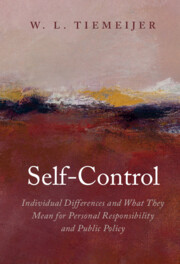 Self-Control
Self-Control Book contents
- Self-Control
- Self-Control
- Copyright page
- Dedication
- Epigraph
- Contents
- Figures
- Tables
- Acknowledgments
- 1 Introduction
- Part I Self-Control
- Part II Implications for Society and Politics
- 7 The Ever-Growing Importance of Self-Control
- 8 Self-Control and Moral Responsibility
- 9 Who Should Get What?
- 10 Conclusion: What Is to Be Done
- Notes
- Bibliography
- Index
8 - Self-Control and Moral Responsibility
from Part II - Implications for Society and Politics
Published online by Cambridge University Press: 20 August 2022
- Self-Control
- Self-Control
- Copyright page
- Dedication
- Epigraph
- Contents
- Figures
- Tables
- Acknowledgments
- 1 Introduction
- Part I Self-Control
- Part II Implications for Society and Politics
- 7 The Ever-Growing Importance of Self-Control
- 8 Self-Control and Moral Responsibility
- 9 Who Should Get What?
- 10 Conclusion: What Is to Be Done
- Notes
- Bibliography
- Index
Summary
The limited nature of self-control gives rise to awkward questions. Are people who get into trouble due to poor self-control really to blame, or simply the innocent victims of circumstances beyond their control? This long and pivotal chapter addresses what the limited nature of self-control means for moral responsibility. On the one hand, poor self-control might at times be a valid excuse, but on the other, we would not want a world in which everyone can claim to be nothing but the innocent victims of their endowments from birth and their social background. These considerations lead straight to one of the most vexing problems in philosophy: How is moral responsibility possible in a universe in which everything is caused by what came before? My strategy for tackling this question is to introduce three distinct epistemological standpoints to look at the problem and to consult two bodies of knowledge: the vast literature on free will and the scholarship on folk intuitions regarding criminal sentencing. Together, these three standpoints and two bodies of knowledge furnish the building blocks for guidelines to decide on matters of poor self-control and moral responsibility.
Keywords
- Type
- Chapter
- Information
- Self-ControlIndividual Differences and What They Mean for Personal Responsibility and Public Policy, pp. 170 - 214Publisher: Cambridge University PressPrint publication year: 2022


